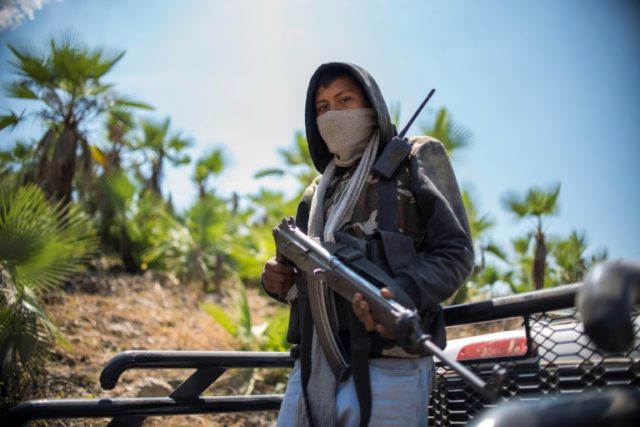Tlacotepec (Mexico) (AFP) – In the rugged mountains of Guerrero, the most violent state in a Mexico awash in blood, the civilians who have taken up arms to protect their communities often tell a similar story.
It goes something like this: “I was kidnapped by a gang, so I decided to fight fire with fire.”
That is how Juan Carlos Ramos, a mechanic, ended up patrolling his hometown with a .22-caliber rifle in his hands and a pistol in a side holster.
“The Familia Michoacana (drug cartel) kidnapped me for seven months. They kidnapped my brother for four months,” Ramos, 30, told AFP.
He was freed by the Mexican marines in a raid, and decided to become a vigilante, protecting his town, Teloloapan, from the more than 20 drug cartels and criminal gangs sowing terror in Guerrero.
The southern state registered 2,318 murders last year — the most violent state in a year that set a record for violence in Mexico, with 25,339 murders nationwide.
Across Mexico, more than 200,000 people have been killed in a wave of bloodshed that has engulfed the country since the government deployed the army to fight drug cartels in 2006.
Last year, Guerrero also saw 10,000 robberies, 246 rapes and 69 kidnappings.
The human suffering behind those statistics is plain to see in the state, where criminal groups terrorize and extort with impunity and there is virtually no trace of a government presence in many areas.
“Most of us just want peace,” said Ramos, who now spends much of his free time patrolling Teloloapan in khaki fatigues, his guns at his side.
His brother, Luis Alberto, a 32-year-old trucker, is a member of the community police force too.
Across Guerrero, there are dozens of civilian forces like this one, and more keep appearing as the wave of violence continues.
“The Familia Michoacana kidnapped my wife. Then they kidnapped my son,” said Misael Figueroa, 46, speaking in rapid-fire syllables as if someone were chasing him.
Figueroa, a school teacher, now doubles as a community police force leader in the village of Apaxtla.
He called the rise of such groups over the past two decades a “second revolution” — a reference to the Mexican Revolution of 1910, when impoverished rural Mexicans rose up against a corrupt and faraway government.
“We just want to get back the peace and tranquility we lost,” Figueroa said as he stood night watch at a lookout post.
– Blurring the lines –
Hundreds of self-defense force members like these gathered in the small town of Tlacotepec last month for a sort of vigilante conference.
Toting automatic weapons and hunting rifles, they packed the town’s bullfighting ring and inundated its streets, where the only sign of official law enforcement was a pair of unarmed policemen.
Leaders say there are 7,000 community policemen in the surrounding area.
Many of them say they are funded by donations from their communities.
But the line between the community police forces and the criminal groups they fight can be blurry.
Some openly admit to farming poppies to extract opium gum, the substance used to make heroin.
Poppy farming is one of the main sources of income in this impoverished state. It is also part of what makes it the scene of bloody turf wars between rival drug cartels.
Community policemen took AFP reporters on a tour of local poppy fields. Vast splashes of fuchsia flowers nestled in the mountains, their beauty belied the violence they have sparked in the region.
Speaking on condition of anonymity, a coordinator of the local community police force said locals had little choice.
“Why don’t these assholes (the government) build a factory or get a company to come here, so people can stop farming this stuff?” he said.
Many community policemen say they long to get back to their day jobs full-time.
“It’s no kind of life, living with all this tension,” said Laurencio Miranda, a 45-year-old teacher toting a rifle and pistol.
“The authorities are supposed to do their job, and we’re supposed to do ours, with pencils and tools.”

COMMENTS
Please let us know if you're having issues with commenting.